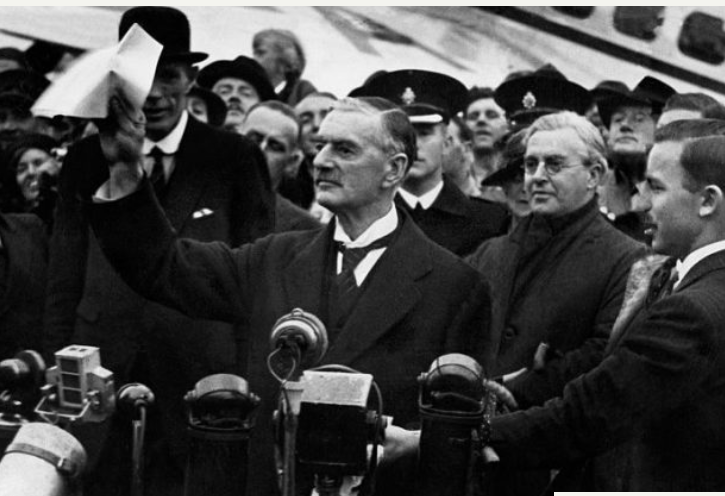The U.S.-Soviet World War II Alliance: an Overlooked Legacy?
-
This hour long presentation was broadcast live this am at 11:00 EDT. A few here may be interested in listening to it in its entirety. Stephen Kotkin from Princeton University has some very interesting points for consideration:
Link to video -
Saving an audio version to listen to later. Good find.
-
Lots of interesting perceptions there. Notably the way history does not seem to inform American political thinking at all, and how it very much does in Russia, and with good reason.
I also appreciate that the much reviled Chamberlin understood that an alliance with the Soviets would inevitably put the USSR in Eastern Europe, and how would they get them out. I had never heard that before.
-
Lots of interesting perceptions there. Notably the way history does not seem to inform American political thinking at all, and how it very much does in Russia, and with good reason.
I also appreciate that the much reviled Chamberlin understood that an alliance with the Soviets would inevitably put the USSR in Eastern Europe, and how would they get them out. I had never heard that before.
@mik said in The U.S.-Soviet World War II Alliance: an Overlooked Legacy?:
Notably the way history does not seem to inform American political thinking at all, and how it very much does in Russia, and with good reason.
I agree and it is a valid observation. One of the first points my undergraduate Soviet History prof made when introducing his course back in the 1970's was that Russians sleep with a history book under their pillow and their perception of the surrounding world is shaped accordingly.
I have been saving my copy of Kotkin's Stalin: Wating for Hitler, vol. II until his third volume is published. Now that it is clear that the latter won't be available until late autumn 2023 ( I was hoping this year) I think I'll read it. I too am curious about his point about Chamberlain, although I believe British historian, Andrew Roberts, has also made that statement. I read Kotkin's volume I Stalin: Paradoxes of Power last winter and found it very well written and researched ( Kotkin's access to Russian primary source material is a first for foreign scholars). Perhaps the best biography of Stalin to date in English.
-
I cannot help but wonder what this country would be like had it endured the privations the USSR did.
We are just led to believe Chamberlin was a fool and a coward.
@mik said in The U.S.-Soviet World War II Alliance: an Overlooked Legacy?:
We are just led to believe Chamberlin was a fool and a coward.
I've never bought that. Half the people calling him an idiot later were cheering their asses off when he came back from Munich.
I have also wondered how much of an effect Chamberlain's health had on his ability to function - similarly to FDR at Yalta, he can't have been firing on all cylinders when he died so soon after.
-
@mik said in The U.S.-Soviet World War II Alliance: an Overlooked Legacy?:
We are just led to believe Chamberlin was a fool and a coward.
I've never bought that. Half the people calling him an idiot later were cheering their asses off when he came back from Munich.
I have also wondered how much of an effect Chamberlain's health had on his ability to function - similarly to FDR at Yalta, he can't have been firing on all cylinders when he died so soon after.
I don't think Chamberlain's health was an issue at Munich. In fact I think he was quite functional right up to the time he resigned from Churchill's War Cabinet. Certainly Churchill relied on his advice and Chamberlain supported the PM along with Atlee against Halifax and others who wanted to take up Mussolini's offers to broker a peace deal when it became obvious France was going to fall to the Nazis. As well it is also too often overlooked that it was under Chamberlain's watch as PM that all efforts were put towards aircraft production and preparing the RAF for war against Germany. This was a complete reversal of the wait and see policies under his predecessor, Stanley Baldwin.
I suspect Kotkin is a lot closer to the truth about Chamberlain. He saw Germany and France as the only continental powers capable of acting as a counterbalance to the USSR. At the same time though he was aware of France's limitations to sustain any sort of military operation despite its strength on paper. Chamberlain was therefore astute enough to know that Britain needed to focus its attention on sea and air power in the very real event France would falter. As such when Churchill was invited back into cabinet much of the policy was already in place and under early implementation to hold off Germany and keep its armies on the continent.
-
For whatever conflicts remain, I should think the Russia is more concerned with China than the US.
@mik said in The U.S.-Soviet World War II Alliance: an Overlooked Legacy?:
For whatever conflicts remain, I should think the Russia is more concerned with China than the US.
Don't be too sure. Russia is culturally and socially Western. At the same time however its political values are Asian.
 image url)
image url)